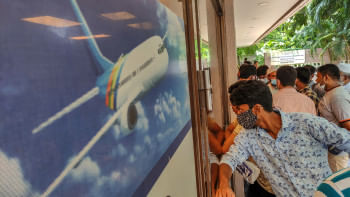A great gesture of goodwill

We are quite relieved to learn that the United Arab Emirates (UAE) has pardoned the 57 Bangladeshi migrant workers who were sentenced to prison for staging demonstrations in that country. The UAE president granted the amnesty on Tuesday, with our foreign adviser saying that the released workers might get another chance to work in the Gulf country. This is a great show of goodwill on the UAE's part, which we deeply appreciate. We also congratulate the interim government for this diplomatic win so early in its tenure.
These people, who had migrated to the UAE seeking better opportunities to support their families, staged peaceful demonstrations on July 19, protesting against the Sheikh Hasina government's crackdown on students who demanded quota reforms in public service recruitment. But as such protests are prohibited in the UAE, they were detained on July 20 and, through an expedited trial on July 21, sentenced to prison for various terms as well as deportation upon serving their sentences. Naturally, the conviction was condemned by human rights advocates at the time. As we also said in this column then, the nature of the punishment was excessive given that the protesters had merely acted on their conscience in a peaceful manner. We also requested the UAE government to consider deportation without imprisonment.
The UAE president's amnesty comes a week after he spoke with the chief adviser of the interim government in a congratulatory call, during which the latter appealed to him for the release of the 57 Bangladeshi nationals. We appreciate the gesture of respect shown to the interim leader as well as the people of Bangladesh. This certainly bodes well for the Bangladesh-UAE relations. Bangladeshis, who constitute one of the largest communities in the UAE, have long been a part of its journey of growth and development. It also remains one of the top sources of remittance for us. We hope that the recent positive exchanges will further deepen our ties, and open the door for fruitful discussion on resolving some labour rights issues faced by our migrants, including abusive labour conditions under the kafala system and alleged exploitation of construction and domestic workers.


 For all latest news, follow The Daily Star's Google News channel.
For all latest news, follow The Daily Star's Google News channel. 







Comments